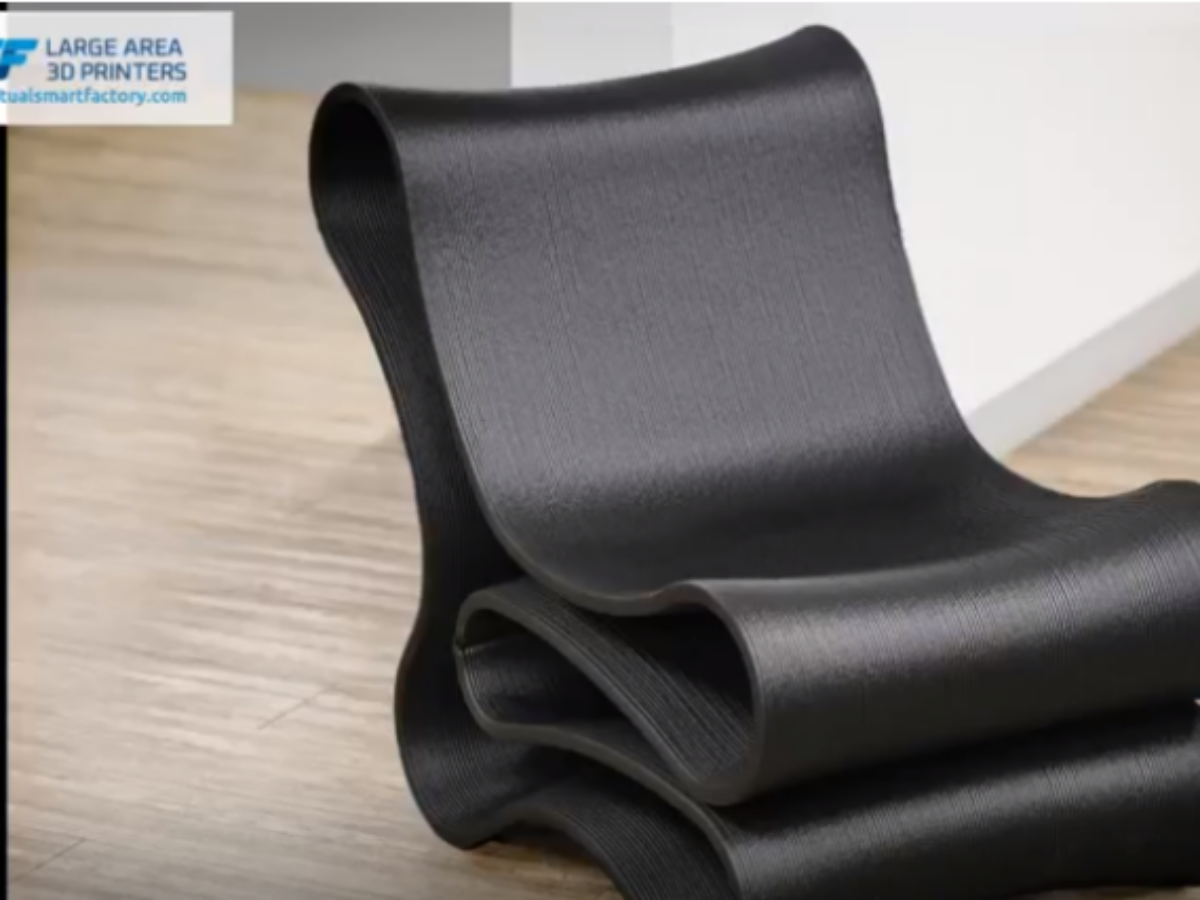Manufacturing news briefs – stories you might have missed

CNC Design prints innovative lounge chair in two hours
Additive manufacturing technology company CNC Design has demonstrated that 3D printing can print large items of furniture in a matter of hours, reducing production time and costs. The company displayed an innovative chair (pictured) at AMW 2023 exhibition at the RMIT University stand utilising a material made of ABS and glass fibre. Printed on its side and weighing a sturdy 50 kg, the chair took only two hours to print. According to CNC Design: “This demonstrates the potential of the technology to produce large, complex, and functional furniture pieces quickly and efficiently.”
NZ Steel to build $283 million electric arc furnace
BlueScope Steel subsidiary New Zealand Steel has announced it will build a new $NZD 300 million ($283 million) electric arc furnace at its steelworks in Glenbrook, Aotearoa New Zealand, as part of the move to lower-carbon production. The conditional deal is part-funded up to $NZD 140 million ($132 million) from the NZ Government Investment in Decarbonising Industry (GIDI) Fund. BlueScope said that furnace will reduce Glenbrook’s carbon footprint by 800,000 tonnes from day one, equivalent to taking around 300,000 cars off the road, and 45 per cent of New Zealand Steel’s emissions. “This project dwarfs anything we have done to date. Alone, it will eliminate one per cent of the country’s total annual emissions,” said NZ prime minister Chris Hipkins. “The plan means New Zealand businesses will have access to locally produced, cleaner steel, and high value jobs are protected that otherwise might have gone offshore.
Archer Materials joins World Economic Forum C4IR Partnership
ASX-listed semiconductor company Archer Materials has announced that is now the first Australian company to partner with the World Economic Forum's Centre for the Fourth Industrial Revolution (C4IR). According to a statement from Archer on Monday, the partnership recognises its leadership and patented innovation in qubit processors and graphene-based biochips for medical
diagnostics. Archer said it will use the partnership to further establish itself “as the only ASX-listed company, and one of only a few in the world, developing accessible and practical quantum computing technology, as well as potentially world-changing medical diagnostics through its graphene-based biochip.” CEO Dr Mohammad Choucair said, “Archer will also have opportunities to accelerate its technology through exclusive access to collaborate with top institutions. Becoming a member of C4IR will provide Archer with several pathways to develop and advance semiconductor technologies.”
Bioxyne buys Breathe
Australian health and medical technologies company Bioxyne has announced the completion of its acquisition of Breathe Life Sciences and its subsidiaries (BLS). Sam Watson, incoming joint CEO — and who co-founded BLS and its predecessor company in 2018 — commented, “on behalf of the shareholders of BLS (now shareholders of BXN), we are excited about the potential synergies between the companies, and we have plans to grow rapidly with this broader range of accessible markets and products.” BLS manufactures and sells (business to business and direct to consumer /patient) plant and mushroom-based wellness products, health supplements and nootropics including CBD, cannabis extracts, vitamins, manuka honey, skin care products, mushroom complexes, and medicinal cannabis, and operates in Australia, the UK, Japan, and Europe, with manufacturing facilities on Japan, Australia, UK, and Czechia.
Amplia Therapeutics has received grant funding to collaborate with researcher CSIRO to develop novel topical formulations of the company's FAK inhibitors. They will develop formulations that can be applied topically, or directly, to wounds and burns to aid healing and reduce scaring. Over-activity of Focal Adhesion Kinase (FAK) in fibroblast cells in wounds is believed to be responsible for laying down cross-linking of collagen, resulting in scar tissue formation. CEO and MD of Amplia Dr Chris Burns said: “There is growing evidence in the scientific literature that inhibition of FAK in the skin may accelerate wound healing and limit scar formation.” The grant funding comes from Innovation Connections, a service under AusIndustry's Entrepreneurs Programme.
Noxopharm's Sofra drug reduces inflammation
Biotechnology company Noxopharm has announced a new preclinical drug candidate from its Sofra technology platform has shown effectiveness against inflammatory skin disease in preclinical models. The company told a conference in Seoul, Korea that the drug SOF-XX represented a new class of therapeutics for the treatment of autoimmune diseases such as psoriasis and lupus. Psoriasis and lupus involve the overactivation of an immune sensor Toll-like receptor 7 (TLR7). When SOF-XX was applied topically via a gel to a mouse model with skin inflammation, it blocked TLRR7 activity and thereby significantly protected mice from the development of skin scaling and redness. There are currently no approved therapeutic inhibitors of TLR7 on the market.
Researchers develop new IED detection tool
A team involving Victoria University (VU) engineers has developed a rapid screening tool aimed at improving detection of homemade improvised explosive devices (IEDs) using organic peroxide explosives (OPEs.) OPEs can be made in home labs, according to a statement from VU. Lead researcher Dr Parvez Mahbub said current screening can mistakenly pick up ingredients used in OPEs, as they are present in some household items such as mail polish remover and toothpaste. “We employed two methods for rapid screening – acid hydrolysis and photolysis,” said Mahbub in a statement on Monday. “They use minuscule amount of acids and advanced light sources such as LEDs to separate hazardous material from non-hazardous. It will be a cheaper, faster and portable screening process suitable for use at airports, other transportation hubs, and concerts.” The results of the research – which also included CSIRO and RMIT university researchers – were published in the peer-reviewed journal Analytica Chimica Acta. The work was funded by the Defence Science Institute.
Picture: CNC Design
@aumanufacturing Sections
Analysis and Commentary Awards casino reviews Defence Gambling Manufacturing News Online Casino Podcast Technology Videos





